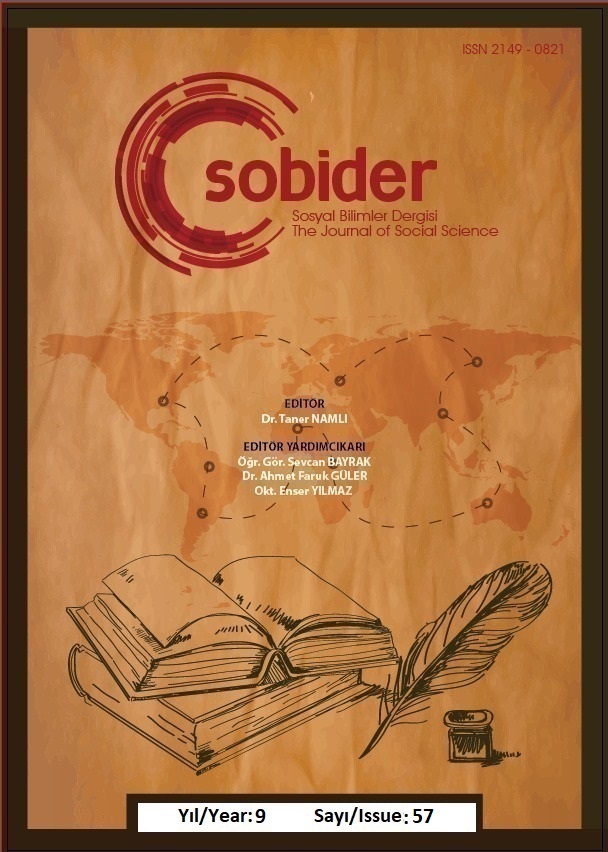Author :
DOI : 10.29228/SOBIDER.58053
Year-Number: 2022-57
Yayımlanma Tarihi: 2022-04-20 22:08:57.0
Language : Türkçe
Konu : Yeni Türk Edebiyatı
Abstract
- N. Tolstoy, romanlarıyla ön planda olan bir sanatçıdır. Kurgusal eserlerinde, yeni sanatsal meziyetler ortaya koymanın yanında Rusya’nın farklı kesimlerini edebiyata taşıyarak genç yaşta büyük yankı uyandırmıştır. Anna Karanina ve Savaş ve Barış romanlarında Rus siyasal yaşamın ve Rus toplumunun katmanlarını ‘gerçeklik’ duygusu içerisinde irdelemiştir. Tolstoy, buna karşın hikâyelerini farklı bir üslupla kaleme almıştır. Bu çalışmada incelenen hikâyeleri, hayatın anlamını sorgulayan, insanın ‘kendini arayış serüvenini’ anlamlandırmaya çalışan eserlerdir. Hikâyelerde vakalar, ‘ahlaki arayışlar’, ‘içsel yolculuk’ üzerine yoğunlaşmıştır. ‘Anlam arayışı’ din ve Tanrı bağlamında değerlendirilmiştir. Bu çerçevede ‘Tanrı sevgisi’, hümanizm bağlamında karşılıksız ‘insan sevgisi’, ‘kanaat’, ‘ölümün mutlak eşitliği’, ‘merhamet’, ‘yoksullara karşılıksız yardım’, ‘yaşlılık’ ve ‘bilgelik’, ‘arınma’ gibi kavramları toplumun yeniden tesisi için ele almıştır. “Ne için yaşıyorum’ sorusunun yanıtını modern bilimde bulamayan Tolstoy, dine yönelir. Kilisenin Hristiyanlık anlayışına karşı çıkarak İncil’i yeniden yorumlayan Tolstoy’un bu çabası, incelenen hikâyelere yansımıştır. İsa’nın öğretisini evrensel değerler ve kavramlarla yoğurmuş, bu değerleri, Rus toplumundan canlı tasvirlerle hikâyelere yerleştirmiştir. Adı zikredilen değerleri, kaleme alarak, Tolstoy, Rus toplumundaki ahlaki erozyonu önleme çabası hissedilmektedir.
Keywords
Abstract
- N. Tolstoy is an artist who is known with his novels. In his fictional works, besides revealing new artistic qualities, at a young age he made a great impression by bringing different parts of Russia to his literatüre. In his Anna Karanina, War and Peace novels, he examined the layers of Russian political life and Russian society with a sense of "reality". Tolstoy, however, wrote his stories in a different style. His stories those examined in this study are works that question the meaning of life and try to make sense of the 'adventure of self-seeking' of mankind. Cases in those stories are focused on 'moral pursuits' and inner journey'. The 'search for meaning' has been evaluated in the context of religion and God. By this point of the religious view; love of God, in terms of humanism; unrequited human love, frugality, absolute justice of death compassion, free aid to the poor, oldness and wisdom, purification and so on, he reevaluated these concepts for the rebuilding of society. Tolstoy, who could not find the answer to the question "What am I living for?" in modern science, then he turns to religion. He opposed the church's understanding of Christianity. He reinterpreted the Bible. This effort of Tolstoy about church and bible was also reflected in the analyzed stories. He mixed the teaching of Jesus with universal values and concepts, and placed these values in his stories with vivid descriptions from Russian society. By writing those mentioned values, Tolstoy's effort to prevent moral erosion in Russian society can be felt in his stories.
Keywords
- Ceylan, Rukiye (2019). Tolstoy'un Hayatı, Eserleri ve Din Görüşü, Yayımlanmamış Yüksek Lisans Tezi, Erzurum.
- Çetinkaya Alaattin. (2020). İncil’e Farklı Bir Yaklaşım: Tolstoy Örneği, On dokuz Mayıs Üniversitesi Sosyal Bilimler Enstitüsü, Yayımlanmamış Yüksek Lisans Tezi, Samsun.
- Doğan, Mehmet (1996). Türkçe Sözlük,
- Karabulut, Mustafa (2011). “Edip Cansever’in ‘Medüza’ Şiirine Varoloşçu Bir Bakış”, Erdem dergisi, Sayı: 61, 147-157.
- Karabulut, Mustafa (2013). “Hikâye Tekniği Bakımından Ömer Seyfettin’in ‘Beyaz Lale’ Hikâyesi”, Hacettepe Üniversitesi Türkiyat Araştırmaları, Yıl: 10, Sayı: 18, 117-129.
- Karabulut, Mustafa (2015). “İmge ve Cumhuriyet Dönemi Türk Şiirinde ‘Su’ İmgesi”, Littera Turca, Journal of Turkish Language and Literature, Volume:1, Issue: 2, Autumn 2015, 65-84.
- Karabulut, Mustafa (2016). “Edip Cansever’in Şiirlerinde Depresif Karakterler”, Adıyaman Üniversitesi Sosyal Bilimler Enstitüsü Dergisi, Yıl: 8 Sayı: 22, DOI Numarası: http://dx.doi.org/10.14520/adyusbd.76648, 35-68.
- Karabulut, Mustafa (2018). “Yahyâ Kemâl’in Hatıralarında ve Şiirlerinde ‘Anne’ İmajı”, Hikmet-Akademik Edebiyat Dergisi [Journal of Academic Literature], Yıl 4, Sayı 8, 2836.
- Karabulut, Mustafa (2019). “Edip Cansever’in Şiirlerinde Böcek Metaforu”, Edebî Eleştiri Dergisi, Cilt: 3/1, DOI: 10.31465/eeder.518838, 27-34.
- Kaziyeva Gaukhar. (2019). Tolstoy’da Anlam Arayışı ve Din İlişkisi, Erciyes Üniversitesi Sosyal Bilimler Enstitüsü, Yayımlanmamış Yüksek Lisans Tezi, Kayseri
- Maylıba Sabina (2016). Tolstoy’un Hikâyelerinde Dini Motifler, Necmettin Erbakan Üniversitesi Sosyal Bilimler Enstitüsü Felsefe ve Din Bilimleri Anabilim Dalı, Yayımlanmamış Yüksek Lisans tezi, Konya.
- Özdemir, Rahman, Ünsal Özlem (2017). Nehlüdov'un Ruhsal Değişimi Işığında Tolstoy'un Dünya Görüşü, Atatürk Üniversitesi Edebiyat Fakültesi Dergisi Atatürk Sayı: 59, Aralık, ss 129-136.
- Tolstoy, Lev Nikolayeviç. (2003a). İnsan Ne İle Yaşar?, Timaş Yayınları, İstanbul.
- Tolstoy, Lev Nikolayeviç. (2003b). Sevgi Neredeyse Tarı Oradadır? Timaş Yayınları, İstanbul.
- Smanbekova, Ludmila. (2002). Tolstoy’un Ahlak Anlayışı, İstanbul Üniversitesi Fen-Edebiyat Fakültesi, Doktora Tezi, İstanbul.
- Steiner, George. (2015). Tolstoy mu Dostoyevski mi. İstanbul: Türkiye İş Bankası Kültür Yayınları. Aktaran: Özdemir, Rahman, Ünsal Özlem (2017). Nehlüdov'un Ruhsal Değişimi Işığında Tolstoy'un Dünya Görüşü, Atatürk Üniversitesi Edebiyat Fakültesi Dergisi Atatürk Sayı: 59, Aralık:,ss 129-136.
- Üstünyer, İlyas (2021). Lev Nikolayeviç Tolstoy ve Türkiye: Türk Edebiyatına Etkisi A. İ. Şifman. Rusçadan Çeviren: İlyas Üstünyer, KaraM, Karadeniz Araştırmaları. XVIII/69: 219-235.





